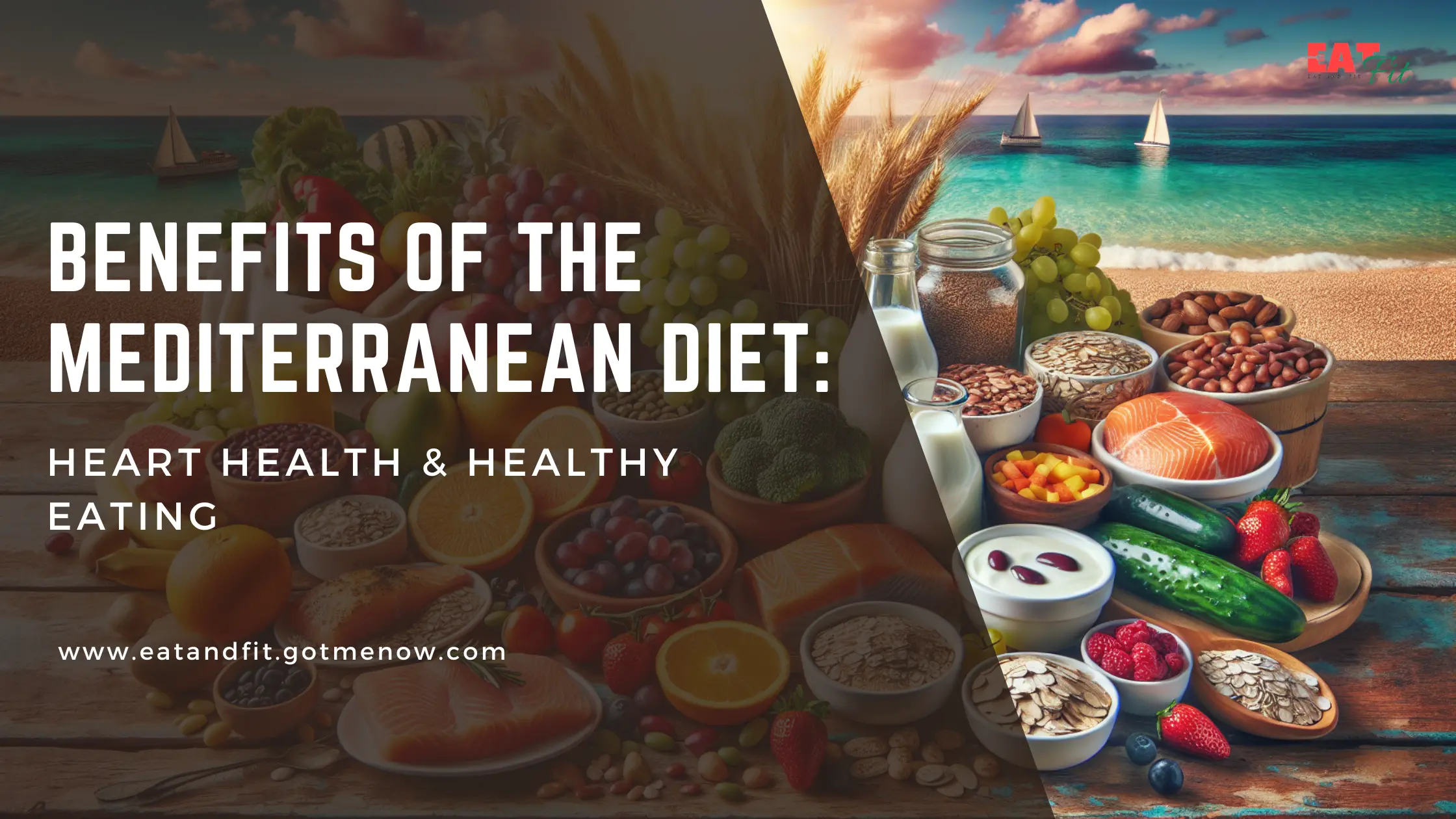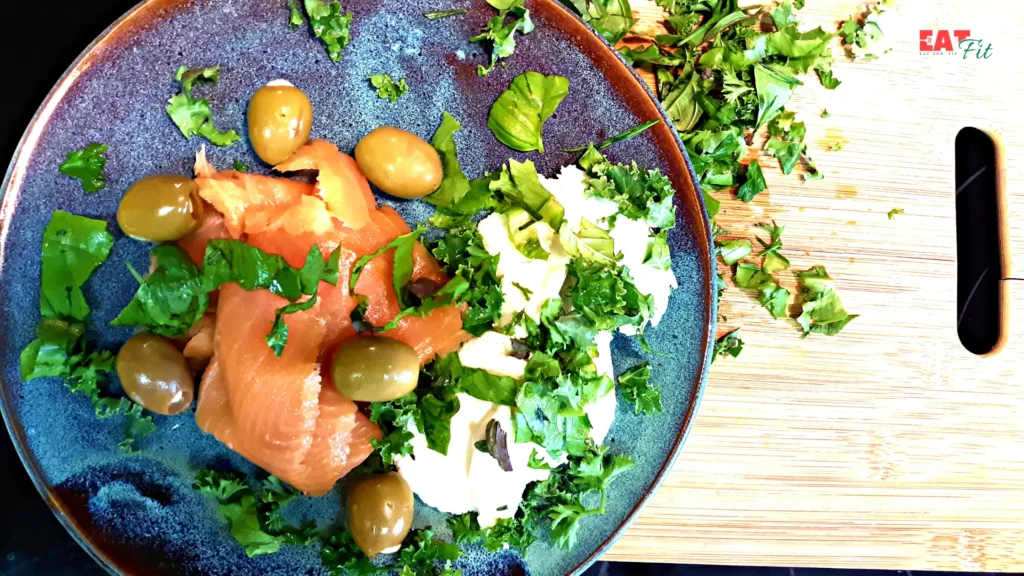The Benefits of a Mediterranean Diet: Reducing Heart Disease Risk and Promoting Healthy Eating

Table of Contents
- Introduction
- Reducing Heart Disease Risk
- Components of a Mediterranean Diet
- Health Benefits of Whole Grains
- Protein-Rich Beans and Lentils
- Lean Proteins: Fish and Poultry
- Low-Fat Dairy Foods
- Conclusion
- FAQ
Introduction
A Mediterranean diet is a way of eating that is inspired by the traditional cuisine of countries bordering the Mediterranean Sea, such as Greece, Italy, and Spain. It is known for its emphasis on fresh fruits and vegetables, whole grains, lean proteins, and healthy fats.
One of the main reasons why a Mediterranean diet is recommended is because of its numerous health benefits. Studies have shown that this type of diet can help reduce the risk of heart disease by 30%. It is also associated with a lower risk of weight gain and can reduce the risk of early death by up to 80%.
The Benefits of the Mediterranean Diet: A Guide to Healthy Living
Reducing heart disease risk is of utmost importance, as heart disease is one of the leading causes of death worldwide. Adopting a Mediterranean diet can be a great step towards improving heart health and overall well-being.
The main components of a Mediterranean diet include:
- Whole grains: These provide important nutrients and fiber.
- Protein-rich beans and lentils: These are a great source of plant-based protein.
- Lean proteins like fish and poultry: These are low in saturated fat and high in omega-3 fatty acids.
- Low-fat dairy foods like skim milk and low-fat yogurt: These provide calcium and other important nutrients.
Reducing Heart Disease Risk
Eating a Mediterranean diet can significantly reduce the risk of heart disease by up to 30%. This way of eating is inspired by the traditional cuisine of countries bordering the Mediterranean Sea, such as Greece, Italy, and Spain. It is characterized by an emphasis on fresh fruits and vegetables, whole grains, lean proteins, and healthy fats.
One of the key benefits of adopting a Mediterranean diet is its ability to lower the risk of weight gain. This is particularly important as excess weight is a major risk factor for heart disease. By incorporating nutrient-dense foods like whole grains and protein-rich beans and lentils, the Mediterranean diet helps to promote satiety and prevent overeating.
Furthermore, following a Mediterranean diet can reduce the risk of early death by up to 80%. This is attributed to the combination of heart-healthy foods and the overall balanced nature of the diet. By prioritizing fresh, unprocessed ingredients and minimizing the consumption of processed foods and added sugars, the Mediterranean diet supports optimal health and longevity.

There are several key ingredients in a Mediterranean diet that contribute to heart health:
- Whole grains: These provide important nutrients and fiber, which help to lower cholesterol levels and reduce the risk of heart disease.
- Protein-rich beans and lentils: These are excellent sources of plant-based protein, which can help to lower LDL (bad) cholesterol and maintain a healthy weight.
- Lean proteins like fish and poultry: These options are low in saturated fat and high in omega-3 fatty acids, which have been shown to reduce inflammation and improve heart health.
- Low-fat dairy foods like skim milk and low-fat yogurt: These provide essential nutrients like calcium and protein, while keeping saturated fat intake in check.
Scientific studies have consistently supported the claims of the benefits of a Mediterranean diet. Research has shown that individuals who adhere to this way of eating have a lower incidence of heart disease and a decreased risk of cardiovascular events. The combination of nutrient-rich foods, emphasis on plant-based ingredients, and avoidance of processed foods contributes to the overall positive impact on heart health.
Components of a Mediterranean Diet
A Mediterranean diet is characterized by its emphasis on fresh fruits and vegetables, whole grains, lean proteins, and healthy fats. By incorporating these key components into your daily meals, you can reap the numerous health benefits of this way of eating.
Importance of Whole Grains
Whole grains are an essential part of a Mediterranean diet. They provide important nutrients and fiber, which are beneficial for heart health. Consuming whole grains can help lower cholesterol levels and reduce the risk of heart disease. Examples of whole grains commonly included in Mediterranean recipes are:
- Oats
- Brown rice
- Quinoa
- Barley
- Whole wheat bread and pasta
Benefits of Protein-Rich Beans and Lentils
Beans and lentils are a great source of plant-based protein in a Mediterranean diet. They are low in fat and high in fiber, making them an excellent choice for maintaining a healthy weight and reducing cholesterol levels. Some common types of beans and lentils used in Mediterranean cuisine include:
- Chickpeas
- Black beans
- Lentils
- Kidney beans
- White beans
Advantages of Lean Proteins like Fish and Poultry
Lean proteins, such as fish and poultry, are important components of a Mediterranean diet. These options are low in saturated fat and high in omega-3 fatty acids, which have been shown to reduce inflammation and improve heart health. Popular lean protein choices in Mediterranean cooking include:
7 Simple Tips to Jump Start Eating the Mediterranean Way Every Day
- Salmon
- Chicken breast
- Turkey
- Tuna
- Sardines
Role of Low-Fat Dairy Foods like Skim Milk and Low-Fat Yogurt
Low-fat dairy foods, such as skim milk and low-fat yogurt, are included in a Mediterranean diet for their calcium and protein content. These dairy options provide essential nutrients while keeping saturated fat intake in check. Incorporating low-fat dairy foods into your meals can help support bone health and provide additional protein. Some examples of low-fat dairy choices in a Mediterranean diet are:
- Skim milk
- Low-fat yogurt
- Feta cheese
- Mozzarella cheese
- Ricotta cheese
Mediterranean Recipes with These Ingredients
There are countless delicious Mediterranean recipes that incorporate these key ingredients. Here are a few examples to get you started:
- Mediterranean Quinoa Salad with Chickpeas and Feta
- Greek-style Grilled Chicken with Lemon and Herbs
- Salmon with Mediterranean Tomato Salsa
- Lentil Soup with Spinach and Tomatoes
- Yogurt Parfait with Fresh Berries and Granola
By incorporating these components into your meals, you can enjoy the flavors of the Mediterranean while improving your heart health and overall well-being.
Health Benefits of Whole Grains
Whole grains are an important component of a Mediterranean diet and offer numerous health benefits. Here are some reasons why you should consider incorporating more whole grains into your diet:
Explanation of the Nutritional Value of Whole Grains
Whole grains are packed with essential nutrients, including dietary fiber, B vitamins, and minerals such as iron, magnesium, and selenium. These nutrients are important for maintaining good overall health and play a role in various bodily functions.
Contribution of Whole Grains to Heart Health
Consuming whole grains has been linked to a reduced risk of heart disease. The fiber found in whole grains can help lower cholesterol levels and maintain healthy blood pressure, both of which are important for heart health. By including whole grains in your diet, you can support a healthy cardiovascular system.
Role of Whole Grains in Weight Management

Whole grains can also aid in weight management. The fiber in whole grains helps to promote feelings of fullness, which can prevent overeating and support weight loss or maintenance. By including whole grains in your meals, you can feel satisfied and avoid excessive calorie intake.
Examples of Whole Grain Options and Their Benefits
There are many delicious whole grain options to choose from, each with its own unique benefits:
- Oats: Rich in soluble fiber, oats can help lower cholesterol levels and promote healthy digestion.
- Brown rice: A good source of fiber, brown rice can help regulate blood sugar levels and support digestive health.
- Quinoa: Packed with protein and fiber, quinoa is a nutrient-dense grain that can help with weight management and provide essential amino acids.
- Barley: High in fiber and antioxidants, barley can promote digestive health and reduce the risk of chronic diseases.
- Whole wheat bread and pasta: These options are made from whole wheat flour, which retains the bran and germ, providing fiber, vitamins, and minerals.
Tips for Incorporating More Whole Grains into Your Diet
If you’re looking to increase your whole grain intake, here are some tips to help you get started:
- Choose whole grain options when buying bread, pasta, and cereals.
- Experiment with different whole grains in your recipes, such as quinoa, barley, or farro.
- Swap white rice for brown rice or other whole grain alternatives.
- Include oats in your breakfast routine by making overnight oats or adding them to smoothies.
- Try incorporating whole grain snacks, such as popcorn or whole grain crackers, into your snack rotation.
By making these simple changes, you can enjoy the nutritional benefits of whole grains and support your overall health and well-being.
Protein-Rich Beans and Lentils
Beans and lentils are not only delicious additions to Mediterranean cuisine, but they also offer numerous health benefits. Here’s why you should consider incorporating more protein-rich beans and lentils into your diet:
Explanation of the Protein Content in Beans and Lentils
Beans and lentils are excellent sources of plant-based protein. They are low in fat and packed with protein, making them a great choice for vegetarians and individuals looking to reduce their meat consumption. Protein is essential for building and repairing tissues, promoting healthy hair and nails, and supporting a strong immune system.
Support for Heart Health
Consuming beans and lentils as part of a Mediterranean diet can support heart health. They are high in fiber, which can help lower cholesterol levels and reduce the risk of heart disease. Additionally, they are low in saturated fat and contain no cholesterol, making them a heart-healthy protein option.
The Authentic Mediterranean Diet: Debunking Myths and Revealing the Real Deal
Role in Providing Essential Nutrients
Beans and lentils are not only a good source of protein, but they also provide essential nutrients. They are rich in fiber, iron, folate, potassium, and magnesium. These nutrients play a vital role in maintaining overall health, supporting digestion, and preventing nutrient deficiencies.
Examples of Mediterranean Dishes Featuring Beans and Lentils
There are countless Mediterranean dishes that showcase the versatility and deliciousness of beans and lentils. Here are a few examples:
- Mediterranean Chickpea Salad
- Spanish Lentil Soup
- Greek-style White Bean Dip
- Italian Pasta e Fagioli
- Moroccan Spiced Lentil Stew
Tips for Adding More Beans and Lentils to Meals
If you’re looking to incorporate more beans and lentils into your meals, here are some tips:
- Add cooked beans or lentils to salads for an extra protein boost.
- Use mashed beans or lentils as a filling in tacos or wraps.
- Make a hearty bean and vegetable soup for a nutritious lunch or dinner.
- Blend cooked beans or lentils into dips or spreads for a flavorful snack.
- Replace meat with beans or lentils in your favorite pasta dishes or casseroles.
By incorporating protein-rich beans and lentils into your Mediterranean-inspired meals, you can enjoy their nutritional benefits while adding variety and flavor to your diet.
Lean Proteins: Fish and Poultry
Lean proteins are an essential component of a Mediterranean diet and offer numerous benefits for heart health. Incorporating lean proteins like fish and poultry into your meals can have positive effects on your overall well-being. Here’s why you should consider including these lean protein sources in your diet:
Benefits of Lean Proteins for Heart Health
Consuming lean proteins is beneficial for heart health as they are low in saturated fat. Diets high in saturated fat have been linked to an increased risk of heart disease. By choosing lean proteins like fish and poultry, you can reduce your intake of saturated fat and promote a healthier heart.
The Importance of Omega-3 Fatty Acids in Fish
Fish, especially fatty fish like salmon and tuna, are excellent sources of omega-3 fatty acids. Omega-3 fatty acids have been shown to have numerous positive effects on heart health. They can reduce inflammation, lower blood pressure, and decrease the risk of abnormal heart rhythms. Including fish in your diet can help provide these essential omega-3 fatty acids and promote a healthy cardiovascular system.
Poultry as a Lean Protein Source
Poultry, such as chicken and turkey, is another important lean protein source in a Mediterranean diet. Poultry is low in saturated fat and can provide high-quality protein for muscle health. It is also a versatile protein option that can be incorporated into a variety of Mediterranean recipes.
Mediterranean Recipes with Fish and Poultry
There are many delicious Mediterranean recipes that showcase the flavors of fish and poultry. Here are a few examples:
- Mediterranean Baked Salmon with Lemon and Herbs
- Greek-style Grilled Chicken Skewers with Tzatziki Sauce
- Italian Herb Roasted Turkey Breast
- Spanish-style Grilled Tuna Steaks
- Moroccan Spiced Chicken Tagine
These recipes incorporate lean proteins and are packed with flavor, making them a nutritious and satisfying choice for a Mediterranean-inspired meal.
Tips for Choosing and Preparing Lean Proteins
When choosing lean proteins, here are a few tips to keep in mind:
- Look for fish that are high in omega-3 fatty acids, such as salmon, mackerel, and sardines.
- Choose skinless poultry cuts to reduce saturated fat intake.
- Opt for grilling, baking, or broiling methods instead of frying to minimize added fats.
- Season proteins with herbs, spices, and citrus juices instead of heavy sauces to enhance flavor without adding extra calories.
By incorporating lean proteins like fish and poultry into your meals and following these tips, you can enjoy the health benefits of a Mediterranean diet while savoring delicious and nutritious dishes.
Low-Fat Dairy Foods
Low-fat dairy foods play an important role in a Mediterranean diet due to their nutritional value and contribution to overall health. Here are some reasons why you should include low-fat dairy in your diet:
Explanation of the Role of Low-Fat Dairy Foods
Low-fat dairy foods, such as skim milk and low-fat yogurt, provide essential nutrients like calcium and protein. These nutrients are important for maintaining healthy bones, teeth, and muscles. Incorporating low-fat dairy into your diet can help support bone health and overall well-being.
Benefits of Skim Milk and Low-Fat Yogurt
Skim milk and low-fat yogurt are excellent choices for those following a Mediterranean diet. Skim milk is low in saturated fat and cholesterol, making it a heart-healthy option. It is also a good source of calcium, vitamin D, and protein. Low-fat yogurt is rich in probiotics, which promote gut health, and it provides essential nutrients while keeping saturated fat intake in check.
Other Low-Fat Dairy Options
In addition to skim milk and low-fat yogurt, there are other low-fat dairy options that can be included in a Mediterranean diet. Some examples include feta cheese, mozzarella cheese, and ricotta cheese. These cheeses provide calcium and protein while containing less saturated fat compared to their full-fat counterparts.
Examples of Mediterranean Dishes Incorporating Low-Fat Dairy
There are numerous Mediterranean dishes that incorporate low-fat dairy, adding flavor and nutritional value. Here are a few examples:
- Mediterranean Quinoa Salad with Feta Cheese
- Greek-style Yogurt Parfait with Fresh Berries and Granola
- Pasta Primavera with Low-Fat Mozzarella Cheese
- Spinach and Feta Stuffed Chicken Breast
- Mediterranean Vegetable Omelette with Low-Fat Ricotta Cheese
Tips for Incorporating Low-Fat Dairy into the Diet
If you’re looking to incorporate more low-fat dairy into your diet, here are some tips:
- Swap regular milk for skim milk in your morning coffee or cereal.
- Add low-fat yogurt to smoothies or enjoy it as a snack with fresh fruit.
- Use low-fat cheese options, such as feta or mozzarella, in salads and sandwiches.
- Experiment with low-fat ricotta cheese in lasagnas or stuffed pasta dishes.
- Try incorporating low-fat dairy as a topping or ingredient in various Mediterranean recipes.
By incorporating low-fat dairy foods into your Mediterranean diet, you can enjoy their nutritional benefits while adding variety and taste to your meals.
Conclusion
In conclusion, adopting a Mediterranean diet can have significant benefits for heart health and overall well-being. The numerous health benefits of this way of eating include reducing the risk of heart disease by 30%, lowering the risk of weight gain, and decreasing the risk of early death by up to 80%. By incorporating key components such as whole grains, protein-rich beans and lentils, lean proteins like fish and poultry, and low-fat dairy foods like skim milk and low-fat yogurt, you can support a healthy cardiovascular system and maintain a balanced diet.
Incorporating a Mediterranean diet into your daily life is an important step towards healthy eating. To learn more about healthy eating tips and how to incorporate the principles of a Mediterranean diet, I encourage you to visit the website hopkinsmedicine.org/foodandnutrition. This website provides valuable information and resources to help you make informed choices and create delicious meals that follow the Mediterranean diet.
In conclusion, adopting a Mediterranean diet can have a positive impact on your heart health and overall well-being. By prioritizing fresh, unprocessed ingredients, and minimizing the consumption of processed foods and added sugars, you can improve your heart health and reduce the risk of heart disease. I encourage you to take the step towards implementing healthy eating habits and adopting a Mediterranean diet for a healthier future.
FAQ
What other health benefits are associated with a Mediterranean diet?
In addition to reducing the risk of heart disease, a Mediterranean diet is associated with various other health benefits. It can help improve brain function, reduce the risk of certain cancers, and promote healthy aging. The emphasis on whole foods and nutrient-dense ingredients in this diet provides a wide range of vitamins, minerals, and antioxidants that support overall health.
Are there any potential drawbacks or considerations when following a Mediterranean diet?
While a Mediterranean diet is generally considered healthy, there are some considerations to keep in mind. The diet can be high in sodium, especially if processed foods are consumed. It’s important to choose minimally processed and low-sodium options. Additionally, individuals with certain dietary restrictions or allergies may need to modify the diet to meet their specific needs.
What are some common misconceptions about the Mediterranean diet?
One common misconception is that the Mediterranean diet is only about eating pasta and olive oil. While these are components of the diet, it is much more diverse and includes a wide variety of fruits, vegetables, whole grains, legumes, and lean proteins. Another misconception is that it is a restrictive diet, but it actually allows for flexibility and enjoyment of a wide range of foods.
Can a Mediterranean diet be customized for specific dietary restrictions or preferences?
Yes, a Mediterranean diet can be customized to accommodate various dietary restrictions or preferences. For example, individuals who follow a vegetarian or vegan diet can focus on plant-based protein sources like beans, lentils, and tofu. Those with gluten sensitivity can choose gluten-free whole grains like quinoa and brown rice. It’s important to focus on the core principles of the Mediterranean diet while adapting it to individual needs.
Are there any specific guidelines or portion sizes to follow when on a Mediterranean diet?
While there are no strict guidelines or portion sizes for a Mediterranean diet, it is important to focus on balance and moderation. The diet emphasizes whole, unprocessed foods and encourages portion control. It’s recommended to fill half of your plate with fruits and vegetables, one-fourth with whole grains, and one-fourth with lean protein. Including healthy fats like olive oil and nuts in moderation is also a key aspect of the diet.








